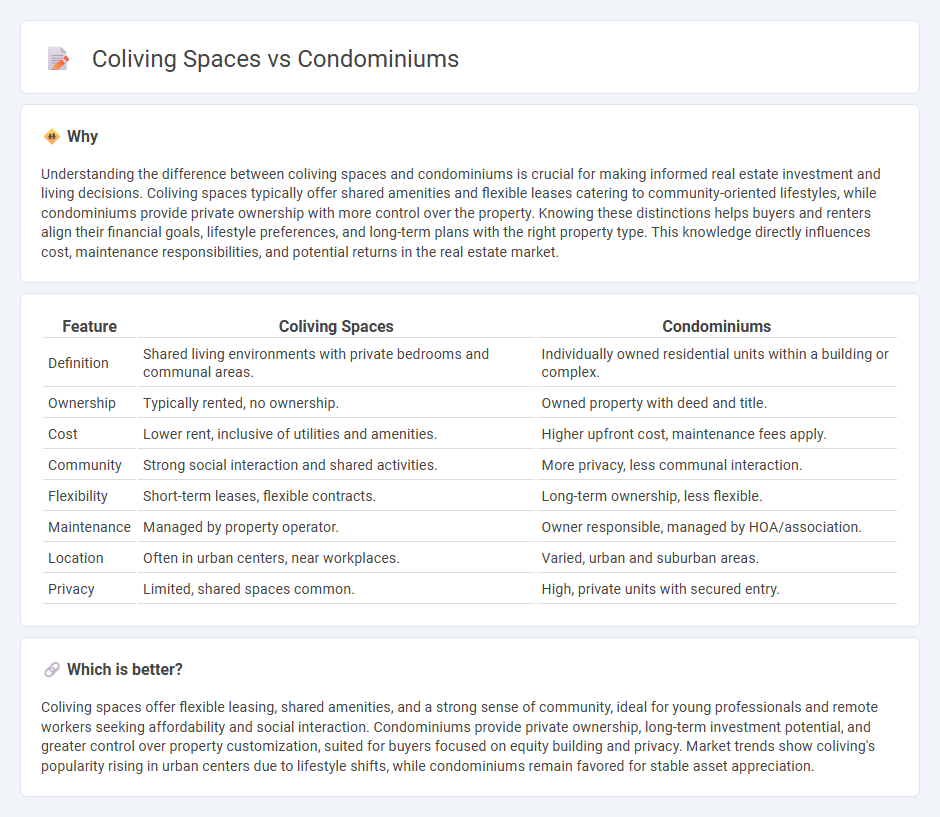
Coliving spaces offer affordable, community-focused living with shared amenities and flexible leases, ideal for young professionals and remote workers. Condominiums provide private ownership with fixed layouts, increased privacy, and long-term investment potential in urban property markets. Explore the benefits of each housing option to determine which suits your lifestyle and financial goals.
Why it is important
Understanding the difference between coliving spaces and condominiums is crucial for making informed real estate investment and living decisions. Coliving spaces typically offer shared amenities and flexible leases catering to community-oriented lifestyles, while condominiums provide private ownership with more control over the property. Knowing these distinctions helps buyers and renters align their financial goals, lifestyle preferences, and long-term plans with the right property type. This knowledge directly influences cost, maintenance responsibilities, and potential returns in the real estate market.
Comparison Table
| Feature | Coliving Spaces | Condominiums |
|---|---|---|
| Definition | Shared living environments with private bedrooms and communal areas. | Individually owned residential units within a building or complex. |
| Ownership | Typically rented, no ownership. | Owned property with deed and title. |
| Cost | Lower rent, inclusive of utilities and amenities. | Higher upfront cost, maintenance fees apply. |
| Community | Strong social interaction and shared activities. | More privacy, less communal interaction. |
| Flexibility | Short-term leases, flexible contracts. | Long-term ownership, less flexible. |
| Maintenance | Managed by property operator. | Owner responsible, managed by HOA/association. |
| Location | Often in urban centers, near workplaces. | Varied, urban and suburban areas. |
| Privacy | Limited, shared spaces common. | High, private units with secured entry. |
Which is better?
Coliving spaces offer flexible leasing, shared amenities, and a strong sense of community, ideal for young professionals and remote workers seeking affordability and social interaction. Condominiums provide private ownership, long-term investment potential, and greater control over property customization, suited for buyers focused on equity building and privacy. Market trends show coliving's popularity rising in urban centers due to lifestyle shifts, while condominiums remain favored for stable asset appreciation.
Connection
Coliving spaces and condominiums share a fundamental connection through their focus on maximizing urban living efficiency by providing private living units within shared environments. Both real estate models emphasize community amenities and social interaction while offering residents individual ownership or leasing options. This integration supports a growing demand for affordable, flexible housing solutions in densely populated metropolitan areas.
Key Terms
Ownership structure
Condominiums offer individual ownership of units with shared ownership of common areas, providing homeowners with a title deed and long-term asset value. Coliving spaces operate on a rental or lease basis, where residents share communal living areas without ownership rights, emphasizing flexibility and affordability. Explore the distinct benefits of each ownership structure to determine the best fit for your lifestyle and investment goals.
Shared amenities
Condominiums typically offer private ownership with shared amenities such as fitness centers, pools, and communal lounges, designed to enhance residents' privacy and security. Coliving spaces prioritize community engagement by providing shared kitchens, coworking areas, and social events, fostering collaboration and social interaction among residents. Explore more about how shared amenities impact lifestyle choices in these living environments.
Lease agreement
Lease agreements in condominiums typically involve long-term commitments, detailed clauses on property maintenance, and individual ownership responsibilities. Coliving spaces offer more flexible, short-term leases with simplified terms, often including utilities and amenities in the rent. Explore our comprehensive comparison to understand which lease structure suits your lifestyle and financial needs best.
Source and External Links
Condominiums Defined - Davis-Stirling.com - A condominium is an estate in real property with undivided common interest plus a separate unit interest, where owners hold title to their units and automatically become members of the managing association.
What is a condo? Condominiums defined - Rocket Mortgage - A condo is a residential complex with individually owned units, owners pay fees to a condominium owners association responsible for maintenance of common areas and enforcing rules.
condominium | Wex | US Law | LII / Legal Information Institute - Condominiums are developments where each owner has title to their unit and membership in a governing association that manages shared areas and amenities funded by fees from each owner.
 dowidth.com
dowidth.com